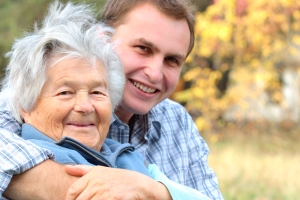We talked to the employees of two large city councils about their eldercare responsibilities and how these affect their work. They reported that their employers and colleagues were generally supportive and knew about their care giving situation. This did not always help when their work was very demanding. Time pressure, and trying to squeeze the demands of care into a working day, caused people strain –
The problem is that a lot of time is spent with the elderly person or travelling, which you don’t have for yourself.
Work doesn’t just go away – it still has to be done – so I work at the weekend.
Often when I pay Mum a visit she is upset or depressed. You cheer her up and think – I’ve got to go back to work in 10 minutes.
A few people mentioned lack of understanding on the part of younger colleagues and managers. Workplaces where there is a predominance of younger staff may be more understanding of issues with children and partners, than with elders. Eldercare can be a conversation-stopper in the tea room.
You come in and say you have had a new baby and everyone cheers and shouts you a drink. You come in and say your father has had a massive stroke and no one wants to know.
Flexible working arrangements are vital. The working carers acknowledged that in some work areas flexibility at short notice may be difficult. Several had taken annual or domestic leave when alternative arrangements couldn’t be used. They were concerned about using up leave when they might need it for a crisis later. Being unable to arrange alternative care meant that some people hadn’t had a “proper” holiday for some time, which impacted on their energy and, ultimately, their health and productivity.
Participants in the discussion groups often mentioned the benefits of being able to use a telephone at work, to make arrangements and appointments and to check up on their family member. But a phone call can also be a source of anxiety: Sometimes Mum leaves the phone off the hook, so I spend the whole day worrying. Some people were worried about privacy or felt guilty about the time spent on the phone and about disturbing others’ working environments. One woman was very embarrassed when she had to shout over the phone to her deaf father.
We asked about crises happening to their elders, such as illness or accidents. Two out of every three people in the study had experienced a crisis in the previous six months, many having to cope with more than one. Crises were more likely the older the care recipient.
Working and caring, even with an understanding employer, is clearly not easy sailing, so we asked people how they felt about it. The majority said they provide eldercare gladly, but acknowledged that it has both positive and negative aspects. We grouped their responses into positive, neutral or negative feelings, with some interesting results. Women carers were less likely to have positive attitudes than men, possibly because they do more. Those who gave the longest hours of care reported higher rates of negative feelings. The highest proportions expressing negative feelings were for those caring for their mothers. Negative feelings were also more common among those caring for someone with a cognitive disability and those who do not have anyone to help them. Only a third said there were no major problems.
The time and energy demands of eldercare can also affect other relationships. One in five working carers thought that caring strains relationships with others they are close to. There is also the potential for guilt on the part of carers. They may feel they are letting down either their work colleagues or their family members. People in management roles need to support their staff in family care situations, but feel that they themselves might be letting down their staff, by “not being there”, due to their own eldercare commitments.
But giving care and support is not always one-way. Several people talked how elders help others within the family. This is less frequent than care and support given by the younger people and tends to decrease with the age of the elder, except for emotional support. It can take the form of giving (or paying for) meals or other food.
I still have a meal with them each week. I think it is Mum still being a mother and making sure I am getting one good meal, a square meal as she would term it.
Being able to reciprocate in some form may help the older people to feel less passive and dependent and is part of intergenerational relationships within families. Giving back can represent delayed reciprocity.
They gave us a huge amount of support. They were our main babysitters for our children and they were the ones that parted with cash for us when we had difficulty.
It also helps when working carers feel that their efforts are recognised. I know that whatever I do Mum appreciates it. Anther woman justified her caring work in intergenerational terms. She considered it good to expose her children to this type of caring, so that they understand that the duty of care moves on.
The study shows how the links between care giving situations and workplace contexts are two-way. At times care giving impacts on work, and at other times work impacts on care giving capacity.
In my next blog I will look at the ways in which working carers cope and what external initiatives would help them.
